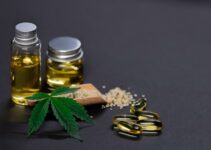As a restless sleeper, I've often felt like I'm caught between two worlds, searching for the best solution to finally get a good night's rest. In this article, we'll explore the age-old question: What's better for sleep, CBD extract or prescriptions? By delving into the science and evidence behind both options, we'll uncover the truth about which one might offer the most effective and sustainable solution for insomnia.
Key Takeaways
- CBD extract may offer benefits in promoting better sleep by helping with anxiety and stress, common contributors to insomnia.
- Natural hemp extracts contain cannabinoids and terpenes that promote relaxation and improve sleep quality without the risk of dependence or tolerance.
- Natural hemp extracts have fewer side effects, such as grogginess or drowsiness the next day, compared to synthetic options and prescription medications.
- CBD presents a promising alternative to prescription sleep aids, with many individuals reporting reduced side effects and improved sleep quality when using CBD for insomnia.
Understanding Insomnia
Understanding insomnia is essential for finding effective sleep solutions. Insomnia can be caused by various factors, including stress, anxiety, depression, medical conditions, or poor sleep habits. Identifying the underlying cause is crucial in determining the most effective treatment. Research has shown that CBD, a compound found in cannabis, may offer benefits in promoting better sleep. Studies indicate that CBD may help with anxiety and stress, which are common contributors to insomnia. Additionally, cognitive-behavioral therapy (CBT) has been found to be an effective treatment for insomnia. It focuses on identifying and changing negative thoughts and behaviors that contribute to sleep problems. Understanding the causes of insomnia and exploring evidence-based treatments, including CBD benefits and research findings, can lead to improved sleep quality and overall well-being.
Hemp Extracts for Sleep
When considering hemp extracts for sleep, it's important to compare the natural benefits and potential side effects with those of synthetic prescriptions. By examining the evidence-based research on both options, we can gain a clearer understanding of their effectiveness and safety. This comparison will provide valuable insights for individuals seeking the best solution for their sleep troubles.
Natural Vs Synthetic Benefits
I've found that natural hemp extracts offer more effective sleep benefits compared to synthetic options. When considering the natural benefits of hemp extracts for sleep, it's important to note the following:
- Therapeutic Effects: Natural hemp extracts contain a variety of cannabinoids and terpenes that work synergistically to promote relaxation and improve sleep quality.
- Studies have shown that these natural compounds have anxiolytic and sedative effects, making them beneficial for sleep without the risk of dependence or tolerance often associated with synthetic options.
- Minimal Side Effects: Unlike some synthetic sleep aids, natural hemp extracts typically have fewer side effects, such as grogginess or drowsiness the next day.
- This makes them a preferred option for individuals seeking a more natural and gentle approach to improving their sleep patterns.
Considering these points, it's clear that natural hemp extracts have distinct advantages over synthetic options when it comes to promoting healthy sleep.
Side Effects Comparison
Natural hemp extracts offer fewer side effects for sleep compared to many prescription medications. When comparing effectiveness, research suggests that CBD may help improve sleep quality without the potential risks associated with prescription sleep aids. A study published in the Permanente Journal found that anxiety and sleep scores improved in over 66% of patients within the first month of using CBD. In contrast, prescription sleep medications can cause side effects such as dizziness, daytime drowsiness, and even a risk of dependency or addiction. Cost comparison also favors hemp extracts, as they are often more cost-effective than prescription medications in the long run. While both options have their pros and cons, the evidence suggests that natural hemp extracts may offer a safer and more affordable alternative for improving sleep quality.
Prescription Sleep Aids Overview
The prescription sleep aids available today offer various options to help manage sleep disorders and improve sleep quality. When considering prescription sleep aids, it's important to understand the sleep stages and how different medications can influence them. Additionally, a proper diagnosis of sleep disorders is crucial to determine the most suitable treatment. Some common prescription sleep aids include:
- Hypnotics: These medications target specific neurotransmitters to induce sleep and may help individuals with insomnia or irregular sleep patterns.
- Benzodiazepines
- Non-benzodiazepine receptor agonists
- Antidepressants: Certain antidepressants can also be prescribed to manage sleep disorders, especially in cases where depression or anxiety is a contributing factor.
- Selective serotonin reuptake inhibitors (SSRIs)
- Serotonin-norepinephrine reuptake inhibitors (SNRIs)
Benefits of CBD for Insomnia
As I explore the benefits of CBD for insomnia, it's important to consider its potential as a natural sleep aid. Research suggests that CBD may help improve sleep quality and duration, offering a promising alternative to prescription sleep aids. Additionally, many individuals report experiencing reduced side effects when using CBD for insomnia compared to traditional medications.
Natural Sleep Aid
Experiencing insomnia led me to explore the benefits of CBD as a sleep aid. As I delved into natural remedies, I discovered that CBD can indeed offer potential benefits for improving sleep. Here's what I found:
- CBD and Sleep Hygiene
- CBD may complement sleep hygiene practices such as maintaining a consistent sleep schedule and creating a relaxing bedtime routine.
- Research suggests that CBD could help regulate the sleep-wake cycle, promoting better overall sleep quality.
Reduced Side Effects
Incorporating CBD into my sleep routine has notably reduced the side effects commonly associated with prescription sleep aids, offering a promising alternative for managing insomnia. CBD's ability to improve sleep quality without the adverse effects typically found in prescription medications makes it an appealing option for those seeking healthier choices. Compared to traditional sleep aids, CBD has shown to have fewer side effects, such as daytime drowsiness, dependence, and withdrawal symptoms. Here's a comparison table highlighting the reduced side effects of CBD compared to prescription sleep aids:
| Side Effects | CBD Extract | Prescription Sleep Aids |
|---|---|---|
| Daytime Drowsiness | Less Likely | Common |
| Dependence | Unlikely | Common |
| Withdrawal Symptoms | Rare | Common |
| Cognitive Impairment | None | Possible |
| Gastrointestinal Issues | Rare | Possible |
These findings suggest that CBD presents alternative options with reduced side effects, making it a promising consideration for those struggling with insomnia.
Side Effects of Prescription Sleep Aids
I experienced drowsiness as a common side effect of prescription sleep aids. This drowsiness often persisted into the next day, affecting my ability to concentrate and perform daily tasks. Other common side effects I encountered included dizziness and impaired coordination, which posed potential safety risks, especially when getting up at night. Additionally, I noticed a tolerance build-up over time, where the effectiveness of the medication decreased, leading to the temptation to increase the dosage. This raised concerns about the potential for dependence and addiction. Considering these health risks, exploring alternative treatments such as cognitive behavioral therapy or natural supplements became imperative. It's crucial to weigh the benefits of prescription sleep aids against these potential side effects and consider alternative options for long-term, sustainable sleep management.
How Hemp Extracts Work for Sleep
Hemp extracts promote relaxation and improve sleep quality by interacting with the body's endocannabinoid system, regulating factors such as stress, anxiety, and circadian rhythm. Studies suggest that hemp extract effectiveness for sleep is linked to its ability to modulate the endocannabinoid system, which plays a crucial role in regulating various physiological processes, including sleep. When considering CBD dosage for sleep, it's essential to start with a low dose and gradually increase it until the desired effects are achieved. Here is a table summarizing some key aspects of hemp extract effectiveness and CBD dosage for sleep:
| Aspect | Hemp Extract Effectiveness |
|---|---|
| Promotes Relaxation | High |
| Regulates Stress | Moderate |
| Improves Sleep Quality | High |
Transitioning into the subsequent section, it's important to consider the risks of long-term prescription use for sleep.
Risks of Long-Term Prescription Use
Transitioning from the discussion on hemp extracts and their effectiveness for sleep, it's crucial to consider the potential risks associated with long-term prescription use for sleep. It's important to note that while prescription sleep aids can be effective for short-term management of sleep disturbances, their long-term use may pose certain risks.
- Risks of long-term use of prescription sleep aids:
- Dependency and tolerance: Prolonged use may lead to dependence on the medication and reduced effectiveness over time.
- Side effects: Long-term use of prescription sleep aids can result in daytime drowsiness, dizziness, and cognitive impairment.
Considering the risks associated with long-term use of prescription sleep aids, exploring alternatives such as natural remedies and lifestyle modifications may be beneficial for promoting sustainable and healthy sleep patterns.
Choosing Between CBD and Prescriptions
When weighing my options for sleep aids, I find it crucial to compare the effectiveness of CBD extract and prescription medications. Both CBD and prescription medications have been studied for their effectiveness in improving sleep. While some research suggests that CBD may help with sleep, the evidence is not yet conclusive, and individual responses can vary. On the other hand, prescription sleep medications have been extensively studied and are known to be effective for many people. When comparing costs, CBD extract may seem more affordable at first glance, but its effectiveness and required dosage can impact the overall cost. Prescription medications, although potentially more expensive upfront, may provide a more predictable and reliable solution for long-term sleep management. Ultimately, the decision between CBD and prescriptions should be based on individual needs, consultation with a healthcare professional, and a thorough consideration of both effectiveness and cost.
Tips for Better Sleep With CBD
Incorporating CBD into my sleep routine has improved my overall quality of rest, providing a natural alternative to traditional prescriptions. Here are some tips for better sleep with CBD:
- Relaxation techniques
- Practice deep breathing exercises before bedtime to calm the mind and body.
- Consider incorporating meditation or gentle yoga into your evening routine to promote relaxation.
- Sleep environment improvements
- Ensure your bedroom is dark, quiet, and at a comfortable temperature to support better sleep.
- Invest in a comfortable mattress and pillows to enhance overall sleep quality.
Frequently Asked Questions
Can CBD Interact With Other Medications I May Be Taking for Sleep or Other Health Conditions?
CBD interactions with other medications, including those for sleep, and other health conditions, should be carefully considered for medication safety. It's important to consult a healthcare professional to ensure safe usage.
Are There Any Specific Dosage Recommendations for Using CBD for Insomnia?
Specific dosages for using CBD for insomnia vary based on individual factors. Research findings suggest starting with 20-30 mg and adjusting as needed. Monitoring for effects is crucial. Consulting a healthcare professional is recommended.
How Does the Quality of the Hemp Extract Affect Its Effectiveness for Sleep?
The quality of hemp extract plays a crucial role in its effectiveness for sleep. Higher quality extracts contain more beneficial compounds, potentially enhancing their sleep-promoting effects. It's important to choose reputable sources for optimal results.
Are There Any Potential Risks of Developing a Tolerance or Dependence on CBD for Sleep?
Risks of developing tolerance or dependence on CBD for sleep are minimal. Potential interactions with other medications exist, so consult a professional. Adhering to dosage recommendations is crucial. It's vital to approach CBD use with caution.
What Are Some Potential Lifestyle or Behavioral Changes That Can Complement the Use of CBD or Prescription Sleep Aids for Better Sleep?
In improving sleep, mindfulness techniques and sleep hygiene practices can complement CBD or prescription sleep aids. These lifestyle and behavioral changes promote relaxation, create a conducive sleep environment, and may enhance the effectiveness of sleep aids.




